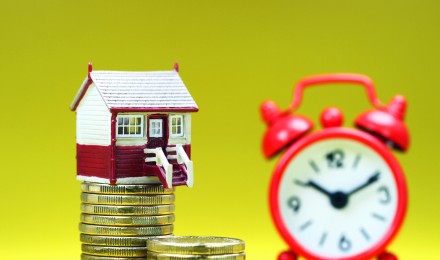Maybe you’re not interested in moving to another house. Therefore, you could care less about the amount of equity in your house. But even if you plan to stay put for the time being, there are good reasons to keep a close watch on it.
Estimating what is equity in your home has financial benefits. As many homeowners know, selling the property is not the only way to tap into it. Depending on how much equity you have, there’s the option of applying for home equity loans and using the cash to consolidate debt, make home improvements or pay for your kid’s education. Additionally, adequate home equity can open the door to refinancing, resulting in a lower interest rate and better loan terms. And the quicker your home gains equity, the sooner you can stop paying mortgage insurance.
What is Equity?
Before we go any further, it’s important that you have a clear understanding of equity. To put it plainly, equity is the difference between what you owe the bank and your home’s worth. Let’s say you owe the bank $175,000, but your house is worth $190,000. In this case, your home’s equity is $15,000.
But, how do you gain equity in your home?
Multiple variables impact how fast your house gains equity. Paying down your mortgage balance is one way to build equity, although it can take years for there to be a noticeable gap between the house’s value and what you owe. However, you can build equity faster by paying more toward your mortgage each month or putting down a larger down payment. But there is yet another way to gain equity.
The housing market in your local area has a direct impact on the amount of equity in your house. Equity isn’t always permanent, thus having a lot of equity today doesn’t mean you’ll have a lot next year. This is because home prices can fluctuate from year-to-year. A decrease in property values closes the gap between what you owe and the home’s value, thus reducing equity. But if property values increase, so does your equity.
Are you preparing to move, refinance or apply for a home equity loan and need to estimate what is equity in your house? Here are three tips to help.
1. Research your home’s value. To estimate your home’s equity, you first need to know how much your house is worth. This isn’t something that you can guess, however acquiring a fairly accurate figure is easier than you might think. There are two ways to approach this. You can either work with a real estate agent and request information on comparable sales for your area, or you can pay for a home appraisal.
Appraisals can run between $300 and $500, depending on the size of your home, but they tend to be more accurate than neighborhood comps. This is because appraisers walk through your house and take into consideration improvements and the overall condition of your home.
2. Add up how much you owe. In addition to your first mortgage, do you have any additional mortgages, such as a home equity loan? Because equity is the difference between what’s owed and the home’s value, you’ll need to contact your lender and calculate the total of all liens on the property.
3. Subtract what you owe from the home’s value. Let’s say you have a first mortgage for $150,000. If an appraiser determines that your house is worth $175,000, you may conclude that your home’s equity is $25,000.
But not so fast. What if you also have a home equity loan for $10,000? Given this scenario, you actually owe the bank a total of $160,000, which decreases your home’s equity to $15,000.
Maybe you’re not interested in moving to another house. Therefore, you could care less about the amount of equity in your house. But even if you plan to stay put for the time being, there are good reasons to keep a close watch on it.
Estimating what is equity in your home has financial benefits. As many homeowners know, selling the property is not the only way to tap into it. Depending on how much equity you have, there’s the option of applying for home equity loans and using the cash to consolidate debt, make home improvements or pay for your kid’s education. Additionally, adequate home equity can open the door to refinancing, resulting in a lower interest rate and better loan terms. And the quicker your home gains equity, the sooner you can stop paying mortgage insurance.
What is Equity?
Before we go any further, it’s important that you have a clear understanding of equity. To put it plainly, equity is the difference between what you owe the bank and your home’s worth. Let’s say you owe the bank $175,000, but your house is worth $190,000. In this case, your home’s equity is $15,000.
But, how do you gain equity in your home?
Multiple variables impact how fast your house gains equity. Paying down your mortgage balance is one way to build equity, although it can take years for there to be a noticeable gap between the house’s value and what you owe. However, you can build equity faster by paying more toward your mortgage each month or putting down a larger down payment. But there is yet another way to gain equity.
The housing market in your local area has a direct impact on the amount of equity in your house. Equity isn’t always permanent, thus having a lot of equity today doesn’t mean you’ll have a lot next year. This is because home prices can fluctuate from year-to-year. A decrease in property values closes the gap between what you owe and the home’s value, thus reducing equity. But if property values increase, so does your equity.
Are you preparing to move, refinance or apply for a home equity loan and need to estimate what is equity in your house? Here are three tips to help.
1. Research your home’s value. To estimate your home’s equity, you first need to know how much your house is worth. This isn’t something that you can guess, however acquiring a fairly accurate figure is easier than you might think. There are two ways to approach this. You can either work with a real estate agent and request information on comparable sales for your area, or you can pay for a home appraisal.
Appraisals can run between $300 and $500, depending on the size of your home, but they tend to be more accurate than neighborhood comps. This is because appraisers walk through your house and take into consideration improvements and the overall condition of your home.
2. Add up how much you owe. In addition to your first mortgage, do you have any additional mortgages, such as a home equity loan? Because equity is the difference between what’s owed and the home’s value, you’ll need to contact your lender and calculate the total of all liens on the property.
3. Subtract what you owe from the home’s value. Let’s say you have a first mortgage for $150,000. If an appraiser determines that your house is worth $175,000, you may conclude that your home’s equity is $25,000.
But not so fast. What if you also have a home equity loan for $10,000? Given this scenario, you actually owe the bank a total of $160,000, which decreases your home’s equity to $15,000.







